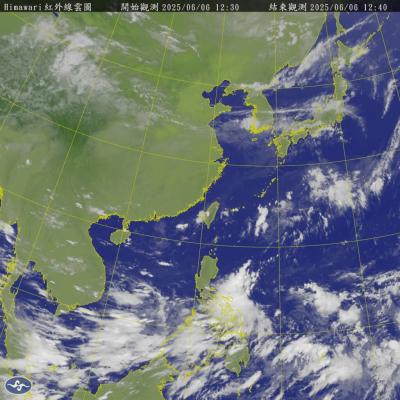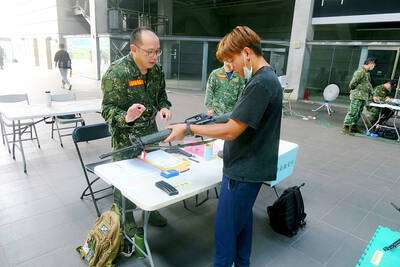General Chen Bingde (陳炳德), chief of the general staff of the People’s Liberation Army (PLA), is highly unlikely to fully achieve the goal of ending US arms sales to Taiwan during his visit to the US this week, but could nevertheless make some headway, an analyst said.
Dean Cheng (成斌), a research fellow on Chinese political and security affairs at the Heritage Foundation’s Asian Studies Center, said in a paper published on Tuesday that Chen’s visit was “significant.”
In addition to ending arms sales to Taiwan, Cheng said Chen also wanted to end or reduce US air and naval surveillance operations off China’s coast and end sanctions on sales of advanced technology to Beijing.
“Perhaps the Chinese side is chasing impossible goals,” Cheng said. “Yet, one is left wondering why the [US] has still made no move to meet Taiwan’s legitimate defense needs — most notably by making available the new F-16C/D and F-16A/B upgrades they have expressed interest in.”
“One can only wonder whether Chen’s visit will further delay Taiwan arms sales to the detriment of Taipei’s security. If so, the Chinese will have achieved one real goal in exchange for promises of future meetings,” he said.
Chen and seven other PLA generals arrived in the US on Sunday and will stay for one week.
Aside from visits to Washington, Los Angeles and the Grand Canyon, the Chinese delegation will hold talks with Chairman of the Joint Chiefs of Staff Admiral Mike Mullen, US Secretary of Defense Robert Gates and US Secretary of State Hillary Rodham Clinton.
It has been seven years since a US chairman of the Joint Chiefs met with his four-star Chinese counterpart.
The Washington Post has reported that the Pentagon was portraying the visit as a “breakthrough” in its attempts to resume military relations with China, which “Beijing angrily severed early last year” after US President Barack Obama announced a US$6 billion arms deal with Taiwan.
US military officials have told the Post they were not “kowtowing to the Chinese” and that their primary objective was to open basic lines of communication with the PLA.
Otherwise, they said, there was a risk that small security conflicts in the Pacific region could quickly “balloon into major crises.”
Insiders have told the Taipei Times that, for its part, China is making arms sales to Taiwan the central issue of the visit.
“When you see all the Chinese talking points — about mutual respect and benefits — they all come back to ‘Don’t sell arms to Taiwan.’ So in some ways, it’s nice and simple,” Cheng said.
Chen’s military position means that he ultimately has responsibility for the development of war plans and control of PLA operations in the event of war, Cheng said, adding that the US and China had very different views of the purpose of military-to-military contacts.
While the US side seeks to create rules and norms in order to make the two sides’ actions more predictable, the Chinese want to tackle strategic issues such as US relations with Taiwan.
“The US remains the strongest power in the Asia-Pacific region and it loses nothing by being willing to engage, but it should never sacrifice support for friends and allies or abandon its principles in deference to a robust US-China meeting schedule,” Cheng said.

STAY AWAY: An official said people should avoid disturbing snakes, as most do not actively attack humans, but would react defensively if threatened Taitung County authorities yesterday urged the public to stay vigilant and avoid disturbing snakes in the wild, following five reported snakebite cases in the county so far this year. Taitung County Fire Department secretary Lin Chien-cheng (林建誠) said two of the cases were in Donghe Township (東河) and involved the Taiwan habus, one person was bit by a Chinese pit viper near the South Link Railway and the remaining two were caused by unidentified snakes. He advised residents near fields to be cautious of snakes hiding in shady indoor areas, especially when entering or leaving their homes at night. In case of a

A tropical disturbance off the southeastern coast of the Philippines might become the first typhoon of the western Pacific typhoon season, the Central Weather Administration (CWA) said. The system lacks a visible center and how it would develop is only likely to become clear on Sunday or Monday, the CWA said, adding that it was not yet possible to forecast the potential typhoon's effect on Taiwan. The American Meteorological Society defines a tropical disturbance as a system made up of showers and thunderstorms that lasts for at least 24 hours and does not have closed wind circulation.

ENERGY RESILIENCE: Although Alaska is open for investments, Taiwan is sourcing its gas from the Middle East, and the sea routes carry risks, Ho Cheng-hui said US government officials’ high-profile reception of a Taiwanese representative at the Alaska Sustainable Energy Conference indicated the emergence of an Indo-Pacific energy resilience alliance, an academic said. Presidential Office Secretary-General Pan Men-an (潘孟安) attended the conference in Alaska on Thursday last week at the invitation of the US government. Pan visited oil and gas facilities with senior US officials, including US Secretary of the Interior Doug Burgum, US Secretary of Energy Chris Wright, Alaska Governor Mike Dunleavy and US Senator Daniel Sullivan. Pan attending the conference on behalf of President William Lai (賴清德) shows a significant elevation in diplomatic representation,

The Taipei City Reserve Command yesterday initiated its first-ever 14-day recall of some of the city’s civilian service reservists, who are to undergo additional training on top of refresher courses. The command said that it rented sites in Neihu District (內湖), including the Taipei Tennis Center, for the duration of the camp to optimize tactical positioning and accommodate the size of the battalion of reservists. A battalion is made up of four companies of more than 200 reservists each, it said. Aside from shooting drills at a range in New Taipei City’s Linkou District (林口), the remainder of the training would be at